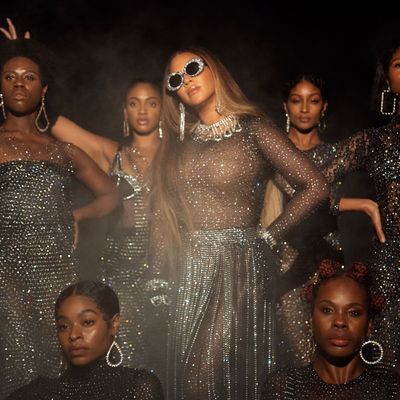
More interesting to me than all hour and 58 minutes of last year’s The Lion King remake was its press tour and how disinterested Beyoncé seemed to be with it. She’d made better movies (Dreamgirls, Obsessed), been on bigger platforms (her concert specials for HBO, Homecoming for Netflix), been a part of telling stories that were just as iconic (again, Dreamgirls and, in another sense, singing at Obama’s inauguration). The live-action Lion King seemed like an odd way for a famously strategic megastar to spend her time; what could it give her that she didn’t already have, what legacy would it build that she hadn’t already constructed for herself a million times over? I imagined her politely declining to record her dialogue in a booth, instead AirDropping voice memos of her lines directly to Bob Iger himself, expecting him to just figure it out and make sure it got to the right people. When she announced her companion album The Gift and its companion visual reinterpretation of the Lion King itself, it made sense: Her dozen lines as Nala were a way to get this larger, more robust vision out into the world.
The original movie guides the narrative, but most of Black Is King is completely new, a hybrid of myth, of folk, of memories, and Hollywood. There’s a headstrong prince who loves to get into trouble, the death of a wise, powerful father, the uncertainty of filling that void, the way loving a woman — and the love of a woman — prepares him for the challenges of his life. Dialogue from the live-action Lion King film is used in Beyoncé’s version, along with her own reflections on Blackness, womanhood, and power. Other voices share their experiences of Black identity and the Black diaspora. Blue Ivy co-stars, Jay-Z shows up, her collaborators and friends make surprising, delightful appearances.
As a collection of music videos, Black Is King works: Beyoncé, the album, proved that she’d mastered more genres, more sounds, more ideas than anyone else in her class. In those videos, she zoomed around the world, in productions that outdid themselves to show how distinct the one you were watching was from the one before it. In Lemonade, she stayed closer to home, with fewer set pieces, to exorcise generational curses and heal a broken heart. Black Is King is a fusion of those two styles, the grandness of self-titled with Lemonade’s full-hearted poetry. Warsan Shire returns to contribute more musings as profound prayers; Jezebel’s Clover Hope, who wrote Beyoncé’s September 2018 Vogue cover’s As Told To is a credited writer, too. In both Lemonade and that cover story, it was a thrilling surprise to see and hear Beyoncé think out loud so intimately. (Still seared into my memory is Beyoncé saying: “I want him to know that he can be strong and brave but that he can also be sensitive and kind,” she said of her son, Sir Carter, to whom Black Is King is dedicated. “I want my son to have a high emotional IQ where he is free to be caring, truthful, and honest.” A handclap for Bey, intent on raising the first good man!) Some of these observations and reflections are cut from the same cloth, but they’re no more or less sage.
It is a stunning, lush visual to watch. The clothes, the art, the braids, her grill! No other artist could make this, at this scale, this beautifully. “Mood 4 Eva” takes the best from her “Partition” visuals and her husband’s for “Family Feud,” with the pure adrenaline that made their joint Carters project so much fun. “Brown Skin Girl” is an exercise in luminosity, with Lupita Nyong’o, Naomi Campbell, and Kelly Rowland dancing to the lyrics they inspired, a portrait of Beyoncé giving the Black women in her life their flowers. “Already” is, frankly, the slickest shit in the world: It’s Beyoncé doing what only Beyoncé can do. No one else can sing like that, dance like that, wear outfits like that, perform like that. There’s something about Beyoncé no feature film has been able to capture or that she hasn’t figured out how to channel into a performance of someone else’s character on someone else’s page. She’s Beyoncé. Period!
When Black Is King stretches to service this bigger structure — of the Lion King story, of ideas about diaspora, of the ancestors — it’s less coherent. (The way in which Beyoncé engages with this politic is worthy of another analysis that would break my brain; the way it communicates her ideas remains murky.) The Lion King dialogue weighs it down, the dutiful exposition and character introduction make the first and third acts feel like they’re moving at a glacial pace. Every time she’s not onscreen, there’s a void of where she should be; the project deflates when you start wondering how soon she’ll come around again. What Black Is King makes clear, ultimately, is that Beyoncé’s imprint on pop culture is too mighty to work normally within a preexisting IP. She is bigger than the House of Mouse, bigger than their cat story; Black Is King shows what it looks like when she tries to color inside someone else’s lines.


